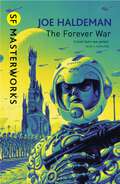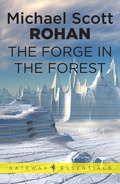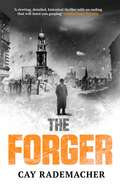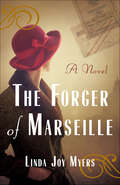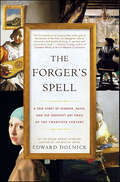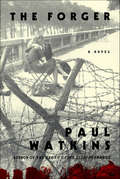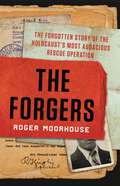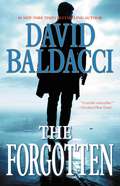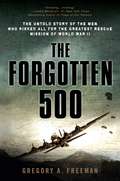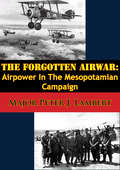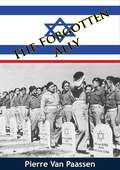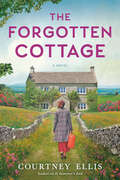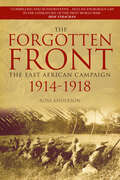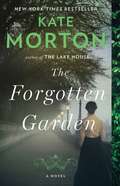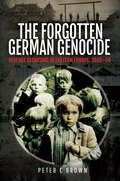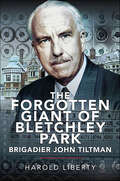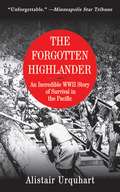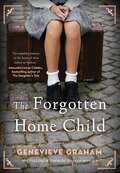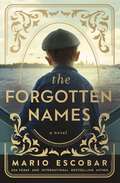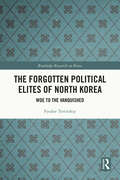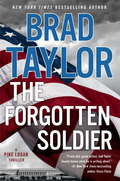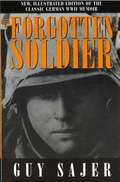- Table View
- List View
The Forever War: Forever War Book 1 (S.F. MASTERWORKS #54)
by Joe HaldemanPrivate William Mandella is a reluctant hero in an interstellar war against an unknowable and unconquerable alien enemy. But his greatest test will be when he returns home. Relativity means that for every few months' tour of duty centuries have passed on Earth, isolating the combatants ever more from the world for whose future they are fighting.Winner of the HUGO AWARD for best novel, 1976Winner of the NEBULA AWARD for best novel, 1975
The Forge in the Forest (Gateway Essentials #293)
by Michael Scott RohanThe siege of Kerbryhaine had been raised, the Ekwesh hordes vanquished, the Mastersmith slain. But for Alv - now Elof the Smith - the war was not yet won: Kerbryhaine was still a divided city; the Ekwesh, bloodily defeated, would look for revenge; and the Ice, implacably malevolent, continued its inexorable march southward. So from divided Kerbryhaine Elof, Kermorvan and his companions mounted an expedition to the legendary lost cities of the East; if they managed to reunite the war-torn tribes, perhaps they could stand together against the menace of the Ice. But to Elof and Kermorvan the journey would also bring knowledge: of the Powers ranged for and against them; and the secrets within themselves waiting to be revealed - secrets that would play a part in the war yet to come.
The Forger (Frank Stave Investigations #3)
by Cay RademacherSHORTLISTED FOR THE CWA INTERNATIONAL DAGGER AWARD 2019 Hamburg, 1948In a routine operation, Chief Inspector Frank Stave is shot down. He survives, but transfers from the murder commission to the office combatting the black market. There, Stave is confronted with an enigmatic case: Trummerfrau, women helping to clear rubble from Hamburg's bombed streets, discover works of art from the Weimar period - right next to a unidentified corpse. Shortly afterwards, mysterious banknotes whose existence disturbs the Allies' secret plans begin to pop up on the black market. The Supervisor soon discovers strange parallels between the two cases. With the introduction of a new currency, Stave thinks he is on the brink of a solution. But the truth is dangerous, and not just for him.Praise for the Frank Stave Investigations'Undoubtedly the most powerful work of crime fiction I have read this year' Independent'Vivid and harrowing' Sunday Times'Police procedural, romance, thriller The Murderer in Ruins has a bit of everything and it's one hell of a read.' BücherReader Reviews for The Forger'An excellent series based in Hamburg just after World War II. Interesting characters and story lines - a view from defeated Germany we wouldn't normally hear' *****'Characters were good, plot good and it really highlights post war Germany and the inequalities among both sides. The only really disappointing thing is there is not a fourth one to read' *****'I could not put it down. Brilliant' *****Translated from the German by Peter Millar
The Forger of Marseille: A Novel
by Linda Joy MyersIt’s 1939, and all across Europe the Nazis are coming for Jews and anti-fascists. The only way to avoid being imprisoned or murdered is to assume a new identity. For that, people are desperate for papers. And for that, the underground needs forgers. In Paris, Sarah, a young Jewish artist originally from Berlin, along with her music teacher and father figure, Mr. Lieb, meet Cesar, a Spanish Republican who knows well the brutality of fleeing fascism. He soon recognizes Sarah’s gift. She will become the underground’s new forger.When the war reaches Paris, the trio joins thousands of other refugees in a chaotic exodus south. In Marseille, they’re received by friends, but they’re also now part of a resistance the government is actively hunting. Sarah, now Simone, continues her forgery work in the shadows, expertly creating false papers that will mean the difference between life and a horrifying death for many. When Mr. Lieb is arrested and imprisoned in Les Milles internment camp, Simone, Cesar, and their friends vow to rescue him, enlisting the help of American journalist Varian Fry, known for plotting the escapes of high- profile people like Andre Breton and Marc Chagall. In this enlightening and thrilling story of war, love, and courage, author Linda Joy Myers explores identity, ingenuity, and the power of art to save lives.
The Forger's Spell: A True Story of Vermeer, Nazis, and the Greatest Art Hoax of the Twentieth Century
by Edward Dolnick“Mesmerizing account of an amateur artist who made millions selling forged paintings to art-obsessed Nazis and business tycoons” (Kirkus, starred review).New York Times–BestsellerA New York Times Staff Pick“Dolnick brilliantly re-creates the circumstances that made possible one of the most audacious frauds of the twentieth century. . . . An incomparable page turner.” —Boston GlobeAs riveting as a World War II thriller, The Forger’s Spell is the true story of Johannes Vermeer and the small-time Dutch painter who dared to impersonate him centuries later. The con man’s mark was Hermann Goering, one of the most reviled leaders of Nazi Germany and a fanatic collector of art.It was an almost perfect crime. For seven years a no-account painter named Han van Meegeren managed to pass off his paintings as those of one of the most beloved and admired artists who ever lived. But, as Edward Dolnick reveals, the reason for the forger’s success was not his artistic skill. Van Meegeren was a mediocre artist. His true genius lay in psychological manipulation, and he came within inches of fooling both the Nazis and the world. Instead, he landed in an Amsterdam court on trial for his life . . . “When it comes to forgery and its ability to fascinate, the bigger the better, and the greater the audacity the more compelling. . . . Author Edward Dolnick has hit the mother lode.” —Los Angeles Times“Dolnick’s zesty, incisive, and entertaining inquiry illuminates the hidden dimensions and explicates the far-reaching implications of this fascinating and provocative collision of art and ambition, deception and war.” —Booklist“A fascinating analysis of the forger’s technique and a perceptive discussion of van Meegeren’s genius at manipulating people.” —Publishers Weekly (starred review)
The Forger: A Novel
by Paul WatkinsAn exciting new novel, by the author of The Story of My Disappearance and Archangel.At the turn of World War II, David Halifax is a young American painter who receives a scholarship to come to Paris and work under the tutelage of the mysterious and brilliant Russian painter, Alexander Pankratov. Getting more than he bargained for, Halifax is quickly subjected to Pankratov's rigid will, and beguiled by the quiet, nude model who poses before them.But Paris is also a city that is holding its breath. The Nazi forces are slowly penetrating the Maginot Line, and the once-indominitable city is now expecting the worst. Beneath Paris' blanket of fear and eerie calm, David Halifax realizes the true purpose of his visit: Pankratov is to train him in duplicating the masterworks of the Paris museums, and with the aid of a wily art dealer, barter the fakes to Hilter's legion of art dealers. What develops is a cat and mouse game through Paris' silent streets, in the tunnels beneath its museums, and eventually into the scorched countryside of Normandy.In David and Pankratov's frantic race to complete the uncompletable, both are forced to confront the terrible sacrifices one must finally make for art; a sacrifice of identity, and perhaps of the soul. In The Forger by Paul Watkins.
The Forgers: The Forgotten Story of the Holocaust's Most Audacious Rescue Operation
by Roger MoorhouseThe secret history of one of the largest—and least-known—rescue operations of World War II Between 1940 and 1943, a group of Polish diplomats in Switzerland engaged in a wholly remarkable—and until now, completely unknown—humanitarian operation. In concert with Jewish activists, they masterminded a systematic program of forging passports and identity documents for Latin American countries, which were then smuggled into German-occupied Europe to save the lives of thousands of Jews facing extermination in the Holocaust. With the international community failing to act, the operation was one of the largest actions to aid Jews of the entire war. The Forgers tells this extraordinary story for the first time. We follow the desperate bids of Jews to obtain these lifesaving documents as the Nazi death machine draws ever closer. And we witness the quiet heroism of a group of ordinary men who decided to do something rather than nothing and saved thousands of lives.
The Forgotten (John Puller Series #2)
by David BaldacciWhen Army Special Agent John Puller finds his aunt dead in Florida, he suspects it's no accident . . . and as local police dismiss the case, the cracks begin to show in a picture-perfect town.Army Special Agent John Puller is the best there is. A combat veteran, Puller is the man the U.S. Army relies on to investigate the toughest crimes facing the nation. Now he has a new case--but this time, the crime is personal: His aunt has been found dead in Paradise, Florida.A picture-perfect town on Florida's Gulf Coast, Paradise thrives on the wealthy tourists and retirees drawn to its gorgeous weather and beaches. The local police have ruled his aunt's death an unfortunate, tragic accident. But just before she died, she mailed a letter to Puller's father, telling him that beneath its beautiful veneer, Paradise is not all it seems to be.What Puller finds convinces him that his aunt's death was no accident...and that the palm trees and sandy beaches of Paradise may hide a conspiracy so shocking that some will go to unthinkable lengths to make sure the truth is never revealed.
The Forgotten 500: The Untold Story of the Men Who Risked All for the Greatest Rescue Mission of World War II
by Gregory A. FreemanNow in paperback the "amazing"( James Bradley, New York Times bestselling author of Flags of Our Fathers) never-before-told story of the greatest escape of the Second World War. In 1944 the OSS set out to recover more than 500 downed airmen trapped behind enemy lines in Yugoslavia. Classified for over half a century for political reasons, the full account of this unforgettable story of loyalty, self-sacrifice, and bravery is now being told for the first time.
The Forgotten Airwar: Airpower In The Mesopotamian Campaign
by Major Peter J. LambertThis thesis discusses the role of airpower in the Mesopotamian Campaign of World War I. Britain conducted military operations against Ottoman forces in Mesopotamia to defend Britain's oil interests and lines of communication, but also to open an additional front against the Turks. The battles conducted from the commencement of hostilities in November 1914 until the Turkish surrender in October 1918 were carried out with the use of a new technology on the battlefield--the aeroplane.This thesis explores the roles of airpower in the Mesopotamian Campaign, and what affect airpower had on military operations. The thesis also looks at the missions of the Royal Flying Corps in Mesopotamia, how they evolved during the course of the conflict, and what impact they had on post-war Royal Air Force development. The study concludes by determining airpower in the Mesopotamian Campaign influenced the policy of air control in the post-war British Empire, and positively influenced the perception of ground commanders to the value of airpower to ground maneuver.
The Forgotten Ally: Plus Excerpt Chapter From The "days Of Our Years"
by Pierre Van PaassenThe Forgotten Ally is a beautifully written book, as the New York Times review describes it--The expression of one of the most passionately generous hearts in the writing profession. Van Paassen writes with the power and fervor of a latter-day prophet, without forgetting the need for facts, figures and documentation.--Review of Chicago Sun Times.Shortly after World War One, Van Paassen started his career as a journalist at The Globe, a Canadian newspaper in Toronto. His next job as a journalist was at the great southern liberal newspaper, The Atlanta Constitution. This is where Van Paassen actively became interested in Jewish affairs after interviewing a Rabbi from New York who had just returned from Mandatory Palestine. From this point on, Van Paassen took a great personal interest in the issues of Palestine and the plight of European Jewry. In 1925, he became the foreign correspondent for the New York Evening World, which placed him in Paris. The stage was being set for World War Two and the rise of fascism in Germany and Italy from which Van Paassen passionately reported. In 1931, the New York Evening World stopped publishing; Van Paassen remained in France and wrote for the Globe and its competitor the Toronto Star. In 1933, Van Paassen, a fluent German speaker, reported on the Nazis and courageously exposed the doctrines and policies of Hitler's fascist regime. His news reports greatly upset the Nazis, and the Toronto Star became known as "atrocity propaganda." The newspaper was banned from Germany and Van Paassen was expelled but not before he was imprisoned by the Nazis for several weeks, which included some physical blows to Van Paassen's own person. Van Paassen spent quite some time in Palestine and wrote extensively for his newspapers and wrote many books on the subject.-Print ed.
The Forgotten Cottage
by Courtney EllisConnected through time to her great-grandmother by a shared English countryside home, an American nurse tries to piece together her family's tangled history in this new historical novel from the acclaimed author of At Summer&’s End. England, 2014: Audrey Collins knows only two things about her beloved grandmother's past: She was born into nobility and she immigrated to America at seventeen years old. So when Audrey inherits her gran's home in North Yorkshire, she arrives expecting a sprawling country estate fit for lords and ladies. Instead, she finds an abandoned stone cottage perfectly preserved as Gran left it when she fled in 1941—ration book and all—and begins to uncover what secrets her family has been keeping. France, 1915: Lady Emilie Dawes is working as a nurse on the Western Front, grateful to have escaped the restraints of her restrictive, privileged home life. But the independence she fought hard to earn is suddenly jeopardized when a familiar man shows up in one of her hospital beds. Facing him means facing her past, and the decisions she had made in fear. As the war rages around her, Emilie realizes she cannot continue running from who she is until she decides who she truly wants to be. Over a hundred years apart, Audrey and Emilie each struggle to find purpose, love, and a place to call home in this enchanting family saga celebrating the courage of underestimated women—and the power a secret can hold across generations.
The Forgotten Front: The East African Campaign 1914-1918
by Ross AndersonThe First World War began in East Africa in August 1914 and did not end until 13 November 1918. In its scale and impact, it was the largest conflict yet to take place on African soil. Four empires and their subject peoples were engaged in a conflict that ranged from modern Kenya in the north to Mozambique in the south. The campaign combined heroic human endeavour and terrible suffering, set in some of the most difficult terrain in the world. The troops had to cope with extremes that ranged from arid deserts to tropical jungles to formidable mountains and almost always on inadequate rations.Yet the East African campaign has languished in undeserved obscurity over the years with many people only vaguely aware of its course of events. Indeed, Humphrey Bogart’s famous film, The African Queen, inspired by an episode of the campaign, often provides its only lasting image. The Forgotten Front is the first full-scale history of this neglected campaign. Ross Anderson details both the fighting and the strategic and political background to the war and the differing viewpoints of the principal protagonists
The Forgotten Garden: A Novel
by Kate MortonFrom the New York Times bestselling author of Homecoming comes a novel that takes readers on an unforgettable journey through generations and across continents as two women try to uncover their family&’s secret past.A tiny girl is abandoned on a ship headed for Australia in 1913. She arrives completely alone with nothing but a small suitcase containing a few clothes and a single book—a beautiful volume of fairy tales. She is taken in by the dockmaster and his wife and raised as their own. On her twenty-fi rst birthday, they tell her the truth, and with her sense of self shattered and very little to go on, "Nell" sets out to trace her real identity. Her quest leads her to Blackhurst Manor on the Cornish coast and the secrets of the doomed Mountrachet family. But it is not until her granddaughter, Cassandra, takes up the search after Nell’s death that all the pieces of the puzzle are assembled. A spellbinding tale of mystery and self-discovery, The Forgotten Garden will take hold of your imagination and never let go.
The Forgotten German Genocide: Revenge Cleansing in Eastern Europe, 1945–50
by Peter C. BrownThe Potsdam Conference (officially known as the "Berlin Conference"), was held from 17 July to 2 August 1945 at Cecilienhof Palace, the home of Crown Prince Wilhelm, in Brandenburg, and saw the leaders of the United Kingdom, the Soviet Union and the United States, gathered together to decide how to demilitarize, denazify, decentralize, and administer Germany, which had agreed to unconditional surrender on 8 May (VE Day). They determined that the remaining German populations in Poland, Czechoslovakia and Hungary - both the ethnic (Sudeten) and the more recent arrivals (as part of the long-term plan for the domination of Eastern Europe) - should to be transferred to Germany, but despite an undertaking that these would be effected in an orderly and humane manner, the expulsions were carried out in a ruthless and often brutal manner. Land was seized with farms and houses expropriated; the occupants placed into camps prior to mass expulsion from the country. Many of these were labor camps already occupied by Jews who had survived the concentration camps, where they were equally unwelcome. Further cleansing was carried out in Romania and Yugoslavia, and by 1950, an estimated 11.5 million German people had been removed from Eastern Europe with up to three million dead. The number of ethnic Germans killed during the ‘cleansing’ period is suggested at 500,000, but in 1958, Statistisches Bundesamt (the Federal Statistical Office of Germany) published a report which gave the figure of 1.6 million relating to expulsion-related population losses in Poland alone. Further investigation may in due course provide a more accurate figure to avoid the accusation of sensationalism.
The Forgotten Giant of Bletchley Park
by Harold LibertyIn recent years, the work of the Bletchley Park codebreakers has caught the public’s imagination with books and films. While men such as Alan Turing and Dilly Knox have been recognized, Brigadier John Tiltman has been hardly mentioned. This overdue biography reveals that ‘The Brig’, as he was known, played a key role. After distinguished Great War military service, he established himself as a skilled codebreaker between the Wars, monitoring Russian and other unfriendly powers’ messages. During World War Two he was regarded as the most versatile of cryptographers, cracking a range of codes including Japanese ones. He made the first breakthrough against the German High Command Lorenz system and what he found led to the creation of machines including Colossus, the first recognisable computer. His lack of recognition may be down to his apparent lack of association with Enigma but, in truth, he was closely involved at the start. In addition to his cryptological brilliance, ‘The Brig’ was a gifted communicator and team-builder whose character combined charm, intelligence, determination and common sense. He was key to building the special relationship with our American partners both during and after the war. Harold Liberty’s biography shines light on a man whose contribution was essential to Britain’s survival and triumph in the Second World War.
The Forgotten Highlander: An Incredible WWII Story of Survival in the Pacific
by Alistair UrquhartAlistair Urquhart was a soldier in the Gordon Highlanders, captured by the Japanese in Singapore. Forced into manual labor as a POW, he survived 750 days in the jungle working as a slave on the notorious "Death Railway" and building the Bridge on the River Kwai. Subsequently, he moved to work on a Japanese "hellship," his ship was torpedoed, and nearly everyone on board the ship died. Not Urquhart. After five days adrift on a raft in the South China Sea, he was rescued by a Japanese whaling ship. His luck would only get worse as he was taken to Japan and forced to work in a mine near Nagasaki. Two months later, he was just ten miles from ground zero when an atomic bomb was dropped on Nagasaki. In late August 1945, he was freed by the American Navy--a living skeleton--and had his first wash in three and a half years. This is the extraordinary story of a young man, conscripted at nineteen, who survived not just one, but three encounters with death, any of which should have probably killed him. Silent for over fifty years, this is Urquhart's inspirational tale in his own words. It is as moving as any memoir and as exciting as any great war movie.
The Forgotten Home Child
by Genevieve GrahamThe Home for Unwanted Girls meets Orphan Train in this unforgettable novel about a young girl caught in a scheme to rid England&’s streets of destitute children, and the lengths she will go to find her way home—based on the true story of the British Home Children.2018 At ninety-seven years old, Winnifred Ellis knows she doesn&’t have much time left, and it is almost a relief to realize that once she is gone, the truth about her shameful past will die with her. But when her great-grandson Jamie, the spitting image of her dear late husband, asks about his family tree, Winnifred can&’t lie any longer, even if it means breaking a promise she made so long ago... 1936 Fifteen-year-old Winny has never known a real home. After running away from an abusive stepfather, she falls in with Mary, Jack, and their ragtag group of friends roaming the streets of Liverpool. When the children are caught stealing food, Winny and Mary are left in Dr. Barnardo&’s Barkingside Home for Girls, a local home for orphans and forgotten children found in the city&’s slums. At Barkingside, Winny learns she will soon join other boys and girls in a faraway place called Canada, where families and better lives await them. But Winny&’s hopes are dashed when she is separated from her friends and sent to live with a family that has no use for another daughter. Instead, they have paid for an indentured servant to work on their farm. Faced with this harsh new reality, Winny clings to the belief that she will someday find her friends again. Inspired by true events, The Forgotten Home Child is a moving and heartbreaking novel about place, belonging, and family—the one we make for ourselves and its enduring power to draw us home.
The Forgotten Locket: An absolutely gripping novel of the power of hope from the bestselling historical fiction author of The Memory Box
by Kathryn HughesA mysterious letter from Spain. A surprising new beginning...Fall in love this summer with Her Last Promise, a gripping, heartwrenching story of how hope can blossom in the ruins of tragedy and of the redeeming power of love. From No. 1 bestselling author Kathryn Hughes.Tara Richards was just a girl when she lost her mother. Years later when Tara receives a letter from a London solicitor its contents shake her to the core. Someone has left her a key to a safe deposit box. In the box lies an object that will change everything Tara thought she knew and lead her on a journey to deepest Spain in search of the answers that have haunted her for forty years.Violet Skye regrets her decision to travel abroad leaving her young daughter behind. As the sun dips below the mountains, she reminds herself she is doing this for their future. Tonight, 4th June 1978, will be the start of a new life for them. This night will indeed change Violet's destiny, in the most unexpected of ways...Readers love the powerful novels of Kathryn Hughes:'A wonderful, enthralling story'Lesley Pearse'Gripping'Good Housekeeping'A heartbreakingly powerful read'Sun
The Forgotten Locket: An absolutely gripping novel of the power of hope from the bestselling historical fiction author of The Memory Box
by Kathryn HughesA beautiful, page-turning and heartwrenching story of how hope can blossom in the ruins of tragedy and of the redeeming power of love. From No. 1 bestselling author of The Letter Kathryn Hughes._______*Previously published as Her Last Promise*Winner Book of the Year in Prima magazine Big Book Awards'Storytelling at its finest with characters that come alive and a plot that dances with intrigue. An absolutely first-class read that does not disappoint' Prima'A gripping read' Woman & Home_______Tara Richards was just a girl when she lost her mother. Years later when Tara receives a letter from a London solicitor its contents shake her to the core. Someone has left her a key to a safe deposit box. In the box lies an object that will change everything Tara thought she knew and lead her on a journey to deepest Spain in search of the answers that have haunted her for forty years.Violet Skye regrets her decision to travel abroad leaving her young daughter behind. As the sun dips below the mountains, she reminds herself she is doing this for their future. Tonight, 4th June 1978, will be the start of a new life for them. This night will indeed change Violet's destiny, in the most unexpected of ways..._______Readers adore this book:'Hope rises from despair and new beginnings are forged in the most extraordinary and unexpected way. Kathryn Hughes delves deeply into the heart and soul of her characters, making them totally relatable...like friends you really care for. My addiction to this novel was total and uncompromising ⭐ ⭐ ⭐ ⭐ ⭐''Wonderful! First book I have read by Kathryn Hughes and will now read her previous stories. I loved it ⭐ ⭐ ⭐ ⭐ ⭐''Unputdownable ⭐ ⭐ ⭐ ⭐ ⭐''Kathryn has a talent for weaving the mystery and bringing the threads together seamlessly ⭐ ⭐ ⭐ ⭐ ⭐''Beautifully written, it will stay with me for a long time ⭐ ⭐ ⭐ ⭐ ⭐''Completely captivating ⭐ ⭐ ⭐ ⭐ ⭐''I really enjoyed this book, especially the nostalgic 1970's descriptions ⭐ ⭐ ⭐ ⭐ ⭐'
The Forgotten Locket: An absolutely gripping novel of the power of hope from the bestselling historical fiction author of The Memory Box
by Kathryn HughesA beautiful, page-turning and heartwrenching story of how hope can blossom in the ruins of tragedy and of the redeeming power of love. From No. 1 bestselling author of The Letter Kathryn Hughes._______*Previously published as Her Last Promise*Winner Book of the Year in Prima magazine Big Book Awards'Storytelling at its finest with characters that come alive and a plot that dances with intrigue. An absolutely first-class read that does not disappoint' Prima'A gripping read' Woman & Home_______Tara Richards was just a girl when she lost her mother. Years later when Tara receives a letter from a London solicitor its contents shake her to the core. Someone has left her a key to a safe deposit box. In the box lies an object that will change everything Tara thought she knew and lead her on a journey to deepest Spain in search of the answers that have haunted her for forty years.Violet Skye regrets her decision to travel abroad leaving her young daughter behind. As the sun dips below the mountains, she reminds herself she is doing this for their future. Tonight, 4th June 1978, will be the start of a new life for them. This night will indeed change Violet's destiny, in the most unexpected of ways..._______Readers adore this book:'Hope rises from despair and new beginnings are forged in the most extraordinary and unexpected way. Kathryn Hughes delves deeply into the heart and soul of her characters, making them totally relatable...like friends you really care for. My addiction to this novel was total and uncompromising ⭐ ⭐ ⭐ ⭐ ⭐''Wonderful! First book I have read by Kathryn Hughes and will now read her previous stories. I loved it ⭐ ⭐ ⭐ ⭐ ⭐''Unputdownable ⭐ ⭐ ⭐ ⭐ ⭐''Kathryn has a talent for weaving the mystery and bringing the threads together seamlessly ⭐ ⭐ ⭐ ⭐ ⭐''Beautifully written, it will stay with me for a long time ⭐ ⭐ ⭐ ⭐ ⭐''Completely captivating ⭐ ⭐ ⭐ ⭐ ⭐''I really enjoyed this book, especially the nostalgic 1970's descriptions ⭐ ⭐ ⭐ ⭐ ⭐'
The Forgotten Names
by Mario EscobarIn August 1942, French parents were faced with a horrible choice: watch their children die, or abandon them forever. Fifty years later, it becomes one woman&’s mission to match the abandoned names with the people they belong to.Five years after the highly publicized trial of Klaus Barbie, the &“Butcher of Lyon,&” law student Valérie Portheret began her doctoral research into the 108 children who disappeared from Vénissieux fifty years earlier, children who somehow managed to escape deportation and certain death in the German concentration camps. She soon discovers that their rescue was no unexplainable miracle. It was the result of a coordinated effort by clergy, civilians, the French Resistance, and members of other humanitarian organizations who risked their lives as part of a committee dedicated to saving those most vulnerable innocents.Theirs was a heroic act without precedent in Nazi-occupied Europe, made possible due to a loophole in the Nazi agenda to deport all Jewish immigrants from the country: a legally recognized exemption for unaccompanied minors. Therefore, to save their children, the Jewish mothers of Vénissieux were asked to make the ultimate sacrifice of abandoning them forever.Told in dual timelines, The Forgotten Names is a reimagined account of the true stories of the French men and women who have since been named Righteous Among the Nations, the children they rescued, the stifled cries of shattered mothers, and a law student, whose twenty-five-year journey allowed those children to reclaim their heritage and remember their forgotten names.World War II historical fiction inspired by true eventsIncludes discussion questions for book clubs, a historical timeline, and notes from the authorBook length: 70,000 wordsAlso by author: Auschwitz Lullaby, Children of the Stars, Remember Me, The Librarian of Saint-Malo, The Teacher of Warsaw, The Swiss Nurse
The Forgotten Political Elites of North Korea: Woe to the Vanquished (Routledge Research on Korea)
by Fyodor TertitskiyThis book comprises the biographies of the North Korean politicians whose actions played a pivotal role in shaping the formation of the country during the late 1940s, the Korean War of 1950-53 and the power struggles of the mid-1950s.Drawing from a rich array of archival material in both Korean, Russian and oral testimonies, this book gives insight into the life stories of key figures such as Pang Hak-se, the founder of North Korea's secret police; Lee Sang-jo, a rebellious and idealistic North Korean ambassador; and Mun Il, the secretary of North Korea’s first leader, Kim Il-sung. The biographies offer fresh perspectives into significant events in North Korean history such as the rise of Kim Il-sung and the reasons behind his selection as the nation's leader, The book also reveals how crucial events during the Korean War, such as the Inchon Landing Operation and China's entry into the war, shed new light on North Korean history.Unveiling the lives and impact of influential politicians in a notoriously secretive nation, this book will appeal to a wide range of readers including students and scholars of North Korea, the Korean War, the Cold War era, Asian history and those interested in the biographies of significant historical figures.
The Forgotten Soldier
by Brad TaylorIn New York Times bestselling author Brad Taylor's latest heart-stopping thriller, Pike Logan returns with his most dangerous and personal threat yet: a Taskforce Operator gone rogue. For years, the extralegal counterterrorist unit known as the Taskforce has worked in the shadows, anticipating and preventing attacks around the globe. Created to deal with a terrorist threat that shuns the civilized rule of law, it abandoned the same, operating outside of the US Constitution. Though wildly successful, it was rooted in a fear that the cure could be worse than the disease. And now that fear has come home. A Special Forces soldier is killed on an operation in Afghanistan, and complicit in the attack is a government official of an allied nation. While the US administration wants to forget the casualty, one Taskforce member will not. When he sets out to avenge his brother's death, his actions threaten to not only expose the Taskforce's activities, but also destroy a web of alliances against a greater evil. Pike Logan understands the desire, but also the danger. Brought in to eliminate the risk, he's now forced to choose between his friend and the administration he's sworn to protect, while unbeknownst to either of them, the soldier's death is only the beginning....
The Forgotten Soldier
by Guy SajerThis book recounts the horror of World War II on the eastern front, as seen through the eyes of a teenaged German soldier. At first an exciting adventure, young Guy Sajer's war becomes, as the German invasion falters in the icy vastness of the Ukraine, a simple, desperate struggle for survival against cold, hunger, and above all the terrifying Soviet artillery. As a member of the elite Gross Deutschland Division, he fought in all the great battles from Kursk to Kharkov. His German foot soldier's perspective makes The Forgotten Soldier a unique war memoir, the book that the Christian Science Monitor said "may well be the book about World War II which has been so long awaited." Now it has been handsomely republished as a hardcover containing fifty rare German combat photos of life and death at the eastern front. The photos of troops battling through snow, mud, burned villages, and rubble-strewn cities depict the hardships and destructiveness of war. Many are originally from the private collections of German soldiers and have never been published before. This volume is a deluxe edition of a true classic.
